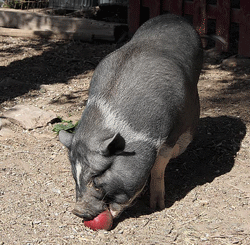Who needs yields? I do, I do! (Breitburn Energy)
 Some of you may recognize our old friend Hoggy the Yield Hog over there, whom I last mentioned in the context of Breitburn Energy. I took the position that colossal plunge in unit price since the partnership announced that it was suspending distributions was entirely unjustified. The partnership was still making money; it was just using it to pay down debt instead of giving it to shareholders, and although this does indicate that the company was in debt trouble, the debt after the announcement was the same as the debt before the announcement and on its way down, so this cannot be blamed on distress.
Some of you may recognize our old friend Hoggy the Yield Hog over there, whom I last mentioned in the context of Breitburn Energy. I took the position that colossal plunge in unit price since the partnership announced that it was suspending distributions was entirely unjustified. The partnership was still making money; it was just using it to pay down debt instead of giving it to shareholders, and although this does indicate that the company was in debt trouble, the debt after the announcement was the same as the debt before the announcement and on its way down, so this cannot be blamed on distress.
The issue of dividends is sharply divided; Modigliani and Miller claim to have proved that a firm’s dividend yield is irrelevant to its value, but the non-academics of the world know that a dollar distributed via dividends is a dollar that the CEO can’t think of a way to waste. A distribution is particularly important for Breitburn because it is a partnership, and the key thing about partnerships under U.S. tax law is that the partners are taxed on their share of partnership income, whether or not that income is actually distributed to them. Better than double taxation, I suppose.
But if you were following the news lately, you will note that Breitburn is in fact resuming its distributions, causing the price to rise by about 11% when the announcement was made (and also settling a lawsuit where they inexplicably decided to stop their largest shareholder from voting for a general partner). The distribution was set at $1.50 a year, which is lower than the $2.52 a year that was their last distribution before they stopped. The price seems to have pinned itself to yield 10%, just as Linn Energy has. I’m not sure what the 10% magic is, although both firms hedge their production years in advance so they probably do have a yield in mind to remain competitive. And the high it made yesterday is only a little bit higher than the high they made a couple days before the announcement.
But this is encouraging. Perhaps more of our target companies can return to normal operations soon too.
Leave a Reply